S’poreans can do cross-border funds transfer to M’sia via PayNow with link to DuitNow in 2022

Soon, two people between Singapore and Malaysia can send each other money using just their mobile numbers.
To be launched in the fourth quarter next year in phases, Singapore’s PayNow and Malaysia’s DuitNow real-time payment systems will be linked.
Customers will also be able to make payments by scanning the NETS or DuitNow QR codes at retail shops and eateries, the central banks of Singapore and Malaysia announced in a joint statement today.
This could facilitate an increase in cross-border remittances and is a sign of both countries’ commitment to boost tourism spending when it returns to the picture in the near future.

“The project will enable more seamless payments for the high volume of remittances between Singapore and Malaysia, which reached S$1.3 billion in 2020. It will also cater to travellers between both countries, which saw sizeable pre-pandemic traffic of about 12 million arrivals yearly on average,” both central banks said in the joint statement.
“Singapore’s remittance corridor with Malaysia is our largest remittance corridor; hence, the PayNow-DuitNow linkage will be an important infrastructure to support cross-border payment needs of individuals and businesses, as well as the growing digital economic activity between both countries,” added Sopnendu Mohanty, Chief FinTech Officer of Singapore’s central bank.
More features in the works
Following the launch, the Monetary Authority of Singapore and Bank Negara Malaysia will progressively expand the PayNow-DuitNow linkage to incorporate a wider range of features and participants.
Both regulators will also explore the feasibility of integrating innovative features such as distributed ledger technology-based solutions to catalyse greater efficiencies in payments clearing and settlement between participating banks.

The PayNow-DuitNow linkage represents another significant milestone in the history of close ties between Singapore and Malaysia, the central banks said.
The linkage closely aligns with the Group of 20’s work of driving faster, cheaper, more inclusive and more transparent cross-border payments, and is a concrete step towards achieving an ASEAN network of linked real-time payment systems.
In mid-September, Singapore’s central bank announced plans to link with India’s unified payments interface by July 2022. Before that, in April, the Singapore central bank said it was linking PayNow with Thailand’s PromptPay.
Featured Image Credit: BNS, Pile
VP Label puts together all the best local products for you to discover in one place. Join us in supporting homegrown Singaporean brands:
[iframe_vp_product src="https://vulcanpost.com/label/embed-all/" id="iframe1"]
Also Read: What are crypto securities and why they are about to give the finance industry a facelift
How this 3-year-old astrology, tarot reading S’pore startup grew to 180K consultations/mth

You no longer need to search high and low for a spiritual guide to provide you a divination for the uncertain future, or browse through the latest horoscope reading and try to decipher what the reading meant for you.
Just tap on your phone and ease your spiritual discomfort via Singapore’s astrology and tarot reading startup Emerging Vision.
Just like how we can have our consultations with our doctors online, the three-year-old startup offers “good energies” and spiritual support through livestreaming services.
Emerging Vision owns the Teller Live app, which is for IOS devices, and Guruji, for Android devices.
These platforms aim to provide a suite of spiritual wellness virtual services like tarot reading and life coaching sessions.
It seems even venture capitalists are also taking this seriously. Just last week, Emerging Vision raised US$4 million in Series A funding, led by Lightspeed Venture Partners.
The funding will be used to expand into new and existing markets, and to enhance the livestreaming technology and the artificial intelligence powered system.
Founder is an “accredited” tarot reader
A self-proclaimed tarot reading expert, founder and CEO Alan Cui is not just some hocus pocus gimmicky fortune teller.
He became an official graduate from the London School of Astrology two months ago. The school teaches “accredited” courses in palmistry and tarot reading.
Alan is not a first time entrepreneur. Back in 2015, he founded Beijing-based Happy Planet, an educational video platform that provides educational content for families.
He tapped on his wealth of experience in video streaming and his passion for astrology to set up Emerging Vision, as he believed in the growing interest in this space.
What are the services available?
Emerging Vision’s apps offer free live public sessions for new users as part of an induction to the app and the spiritual wellness community.
The Singapore-headquartered startup’s apps provide users with interactive, face-to-face consultations with verified astrologers, tarot readers, life coaches and mentors through livestreaming services.
Currently, there are more than 550 verified astrologers from over 10 areas of expertise, in areas such as astrology, tarot reading, palmistry and numerology.
The platforms also provide private paid live sessions for customised consultations.
With the latest fund raise from its Series A round, the company’s total funding is at US$5 million. A part of the funding will be used to launch an e-commerce marketplace selling related items soon for new and existing users.
A Generation Z thing?
On its unusual offering of spiritual well-being services, Alan commented: “Although spiritual services involve centuries-old ancient practices that have existed in myriad forms across countries and religions, the market is highly fragmented and traditionally operates offline.”
The business targets the younger audience – Generation Z-ers who are more open to seeking spiritual enlightenment from tarot and astrology reading.
This app guides as a new transformative approach towards pursuing spiritual wellness amid a fast growing global demand for wellness solutions.
Furthermore, these online services are offered on live streams, giving greater accessibility to the tech savvy Gen Z-ers.
“I believe in tarot readings because the readings that I do for myself and my friends always turn out to be true,” said Emily Choo, 22, an avid tarot practitioner and freelance designer.
Her advice to people who are new to tarot readings: “ I think it’s important to know that the answers from your tarot readings are never definitive. The cards act as a guide to your path but not your destiny. It’s up to you to decide how much you believe in your readings.”
Manifesting success
The spiritual self-care segment is in fact a rapidly expanding portion in the global wellness industry, according to Global Wellness Institute.
The wellness market has expanded by 6.4 per cent since 2017 from US$3.7 trillion to a value of US$4.2 trillion.
These research support Emerging Vision’s growth rate. In just 18 months since the launch of Guriji and three months since the launch of Teller, the firm has had a US$6 million annualised revenue run rate.
It has also grown to 180,000 consultations per month with around 30 per cent of new users returning to book for another consultation in the following month.
The company is expanding, as seen on LinkedIn, and is hiring product managers, engineers, and marketing managers in China.
“Empowered by the latest Live streaming and AI technology, we are here to redefine the online Spiritual Wellness industry,” it said.
Featured Image Credit: Emerging Vision
VP Label puts together all the best local products for you to discover in one place. Join us in supporting homegrown Singaporean brands:
[iframe_vp_product src="https://vulcanpost.com/label/embed-all/" id="iframe1"]
Also Read: Meet Bambi, the modern-day witch: She earns S$70K a month casting spells, teaching witchcraft
M’sian sex & menstrual health brands weigh in on Libresse’s ads that were called “porn”

Recently, menstrual pad brand Libresse came under fire for its Know Your V campaign, which is aimed at normalising discussions surrounding the vagina.
Following the release of its V-Kebaya Limited Edition range of pads, non-profit religious organisation YADIM Muslim Women’s Council (MAYA) called out the brand for its actions that brought “dishonour to women”.
MAYA argued that the use of vulva imagery on Libresse’s products was an exploitation of women’s bodies in advertising.
This event soon blew up on social media, where netizens pitched in to give their two cents on the Know Your V campaign and the use of vulva imagery.
At a glance, it seemed like most netizens were in support of the campaign, challenging MAYA’s statement with their arguments.
But what do other brands within this space think of what went down? Thus, Vulcan Post spoke to businesses that deal with sexual health, sex positivity, and menstrual health. They are:
- Lith Ng, co-owner of online sex shop Erosu;
- Azryn Azhari Arshad (also know as Kakak Kondom), Strategic Partnership Lead at condom maker Karex, and Jun So, Branding Lead at Karex;
- Jeff Chin, founder of condom brand P’sang;
- Nor Faizah Zainal Ariffin, co-founder and Director of Marketing at menstrual cup brand Suci Cup.
A campaign with good intentions
Faizah shared that her team was wary but not surprised at the public’s reaction to Libresse’s campaign.
“In our experience, conversations about menstruation, especially when it involves the female reproductive anatomy, can be very polarising in a public that is steeped in cultural and religious norms.”
Libresse’s campaign hits close to home because it’s in line with Suci Cup’s philosophy too—conversations that deconstruct the taboo and separate myth from fact are important drivers for education and awareness.
Such representation matters, and Libresse has created a space for people to think about and ask questions that they may have been too shy or too ashamed to ask before, Faizah said.
It was also all the more impactful that Libresse, being a larger brand, contributed to this initiative, Lith felt. “Know Your V, we believe, was a great initiative, and it’s rare to see big brands in Malaysia push for this narrative (and by extension, progress), and it for sure sparks confidence and optimism, despite some people heavily disliking it,” she shared.
Aside from sharing the same sentiment, Azryn and Jun added, “We need to normalise open conversations on issues like sexual health and body awareness so women everywhere know that if something out of the ordinary happens, they know where to turn to for help.”
They also brought up some double standards about the controversy, pointing out the ads across Malaysia with explicit messages of how to “keep your man satisfied” or “keep ‘it’ as tight as a virgin’s” that can still be found mainly in rural areas.
Did the vulva imagery help the cause?
It could be said that one of the biggest triggers for the religious groups was the imagery of vulva used by Libresse, despite being heavily stylised as flowers.
Jeff felt that there was nothing wrong with that, likening it to how P’sang would create educational visuals of modified bananas to represent the penis in order to teach its consumers about the anatomy and proper use of condoms.

Lith was all in for using visuals to contribute positively to the conversation too, as she said, “Not everyone can learn through words and speech alone!”
“But it’s not just that. It’s also about the normalisation of these. You’d be surprised by the number of adults who don’t know what their vulvas look like, and by normalising these completely normal and important parts of our bodies, you educate people.”
She did make sure to point out that there still has to be a distinction between what’s too explicit or not, but didn’t think that Libresse crossed that line.

Faizah pitched in, stating that the female body is shrouded in myth and taboo, and therefore is considered both pure and vulgar. Making art using images of the female body then is a way to represent its liberation.
Like Lith, she said, “Normalising images such as these can remind the public that the female body is normal, not just sexual, therefore reducing the stigma associated with female bodily functions.”
But the Suci Cup team believes that a sensitive subject should first be approached in a scientific, factual manner, whereby understanding what the organs do can lead to better appreciation. For example, focusing less on the images of the vulva, and more on conversations with real people.
Malaysia isn’t ready for open conversations yet
Libresse later withdrew its ad campaign from various channels following MAYA’s callout, stating that it had no intention of offending any woman or community.
However, supportive netizens stated that there shouldn’t have been any need for Libresse to do so, and that it was a shame that the brand had to adhere to such a patriarchal narrative.
If they were in Libresse’s shoes, what would our interviewees have done?
As the world’s largest condom maker, Karex is no stranger to the struggles of being a controversial business due to the existing taboos.
Being the face of Kakak Kondom, a fictional character originally built for the sole purpose of bridging the gap surrounding sex ed, Azryn has had her fair share of criticism.

To navigate potential backlash, her team has to make sure that their content is as light as possible, lest they ruffle the feathers of certain communities.
In Faizah’s case, she stated that Suci Cup would have probably taken actions similar to Libresse’s, but with a stronger justification for the goals of the campaign in the first place, which should match the company’s own values.
“For us, the goal is to deliver female reproductive health education and awareness in a fact-based and approachable manner so that more women are comfortable using our product—if the public feels too uncomfortable with it, we can choose to maintain the message but change the approach.”
Lith’s team believes that Libresse didn’t have to pull the campaign, but that it “caved into pressure” and did it because it had to.
“Malaysia isn’t anywhere near the level of openness and acceptance just yet, so it’s hard to say what we’ll do. We want to say that we’ll stand strong by our stance but whether or not it’s the right time to do so, it’s very hard to say.”
Sometimes platforms have to take it slow, it’s about getting your messages across slowly, things aren’t accepted overnight, but it’s up to businesses like us to slowly progress, and educate, regardless of backlash, and to do that you definitely need a platform first and foremost.
Lith, Erosu.
You can be careful, but can’t control people’s perceptions
With their businesses being directly related to private parts and/or sexual health, our interviewees shared their experiences of marketing their products or even just creating relevant content.
As it sells menstrual cups which need to be inserted into the vagina, Suci Cup’s biggest challenge has been answering questions related to the topic of hymens and virginity.
“In order to mitigate the risk of controversy, we collected expert data and professional opinion on a vast array of related topics and produced content using this information in conversational bits and pieces,” Faizah said.

“This fight-with-facts strategy, as well as our team’s strong product and market-relation knowledge, was key in helping the brand get off the ground.”
She added that instead of red tape, they’ve also been lucky to now be considered a hijab-friendly voice for female reproductive health awareness.
Jeff said that until today, P’sang is still figuring out how to publish condom ads, as even just a vector of a condom or penis is categorised as “promoting sex” and will be rejected on the basis of policy violations.
“We are being very careful, trying to share some bold images, but there is a line where we have to be very careful not to cross,” he added.
Guidelines exist, but he concluded that even following them could still result in unpredictable situations, since it’s impossible to control how people perceive content.
Karex has had similar difficulties, and also has to walk on eggshells when it comes to running educational roadshows and events (pre-pandemic).
“It only takes one person to express any sort of displeasure, and in comes the cavalry,” Azryn and Jun said, but added that what’s helped has been “maintain[ing] a good relationship with many partners, local council, and authorities.”
Similarly, while Erosu believes in being open, one has to accept that not everyone will be okay with their values and goals, so a brand shouldn’t go out of its way to push buttons by crossing boundaries.
The way forward is proper sex ed
Brands, large or small, can sometimes make questionable decisions in the name of drawing attention, whether for the awareness of a serious topic or to put themselves in the spotlight.
But like many things that fall within a grey area, Libresse’s Know Your V campaign is polarising and has led to subjective opinions and reactions.
As we move on from this event, there’s an important and long-known but still underdeveloped takeaway: Malaysia needs better sex ed. Not just to learn about consent and sexual health, but also to understand our own bodies better instead of being ashamed by such discussions.
In the bigger picture, Jeff is of the opinion that this is important because having such knowledge can lead to the prevention of child sexual abuse, as experts have stated.
Azryn and Jun shared their views on sex ed, “A helpful first step would be to make a conscious effort to make a distinction between sexualisation and sexuality education.”
Sexualisation is when we limit our bodies to their sexual appeal at the exclusion of all the other characteristics that contribute to us as a whole, whereas sexuality education opens us to learn more about reproductive health, behaviour, and building healthy relationships with ourselves and others.
Azryn and Jun, Karex.
This presents an opportunity for businesses to come in and offer spaces for dialogue and communication, by participating in the conversation.
Additionally, Faizah believes, “The government can normalise the use of clear and correct female reproductive terms as well as pertinent images in their campaigns and broadcasting, regulate misinformation about female reproductive health, and provide more platforms for medical/expert and public engagement.”
Lith echoed the sentiment, saying, “We believe that governments have a duty to educate the people and to move them forward in regards to knowledge and acceptance, and it’s up to the people to make this known to the government.”
“Sometimes people have to take matters into their own hands too, like Libresse attempted to do—and that’s absolutely great.”
Also Read: Laptop subscription services exist, but this M’sian company added on software and IT support
Featured Image Credit: Faizah of Suci Cup / Jun and Azryn of Karex / Jeff of P’sang / Lith of Erosu
Covid-19: 160,000 eligible S’poreans to get S$100 worth of grocery vouchers from Oct 2
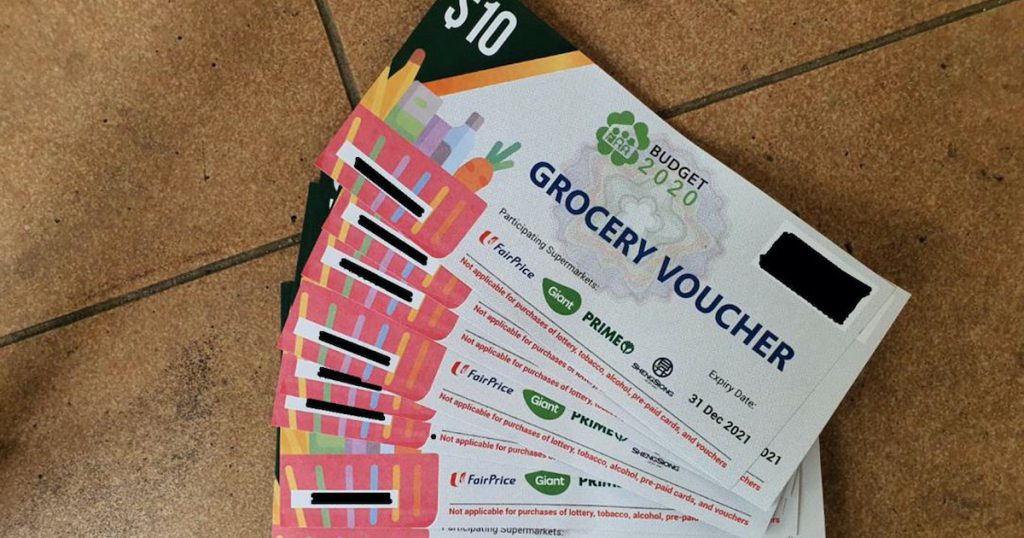
In last year’s Budget, the government unveiled a Care and Support Package to help Singapore househoulds with the cost of living. Particularly, the less well-off will get more help.
As part of this support measure, the Ministry of Finance announced today (Sept 27) that about 160,000 Singaporeans will receive S$100 worth of grocery vouchers next month.
All Singaporeans aged 21 and above this year who live in one- and two-room HDB flats and do not own more than one property are eligible for the vouchers.
According to the ministry, the grocery voucher scheme will provide a total of about S$63 million in financial assistance.
The grocery vouchers can be used at supermarkets including Giant, FairPrice, Prime Supermarket and Sheng Siong.
The vouchers will be delivered to eligible households on Saturdays throughout next month, starting from October 2.
If there is no one at home to receive the vouchers on the delivery day, there will be a second delivery attempt over the following week, between October 4 and 8.
If the second delivery attempt fails, the courier will leave a deliver notification card at the doorstep for recipients to collect their vouchers at a designated post office within 10 working days.
This delivery method differs from last year’s letter box delivery, which led to a string of voucher thefts islandwide. Last year, the worth of grocery vouchers was also much more at S$300.
Featured Image Credit: Singapore Police Force
VP Label puts together all the best local products for you to discover in one place. Join us in supporting homegrown Singaporean brands:
[iframe_vp_product src="https://vulcanpost.com/label/embed-all/" id="iframe1"]
Also Read: GrabMart to airasia fresh: How well do these online grocery platforms in S’pore ‘deliver’?
Why S’pore cannot be held hostage by those who refuse to get vaccinated
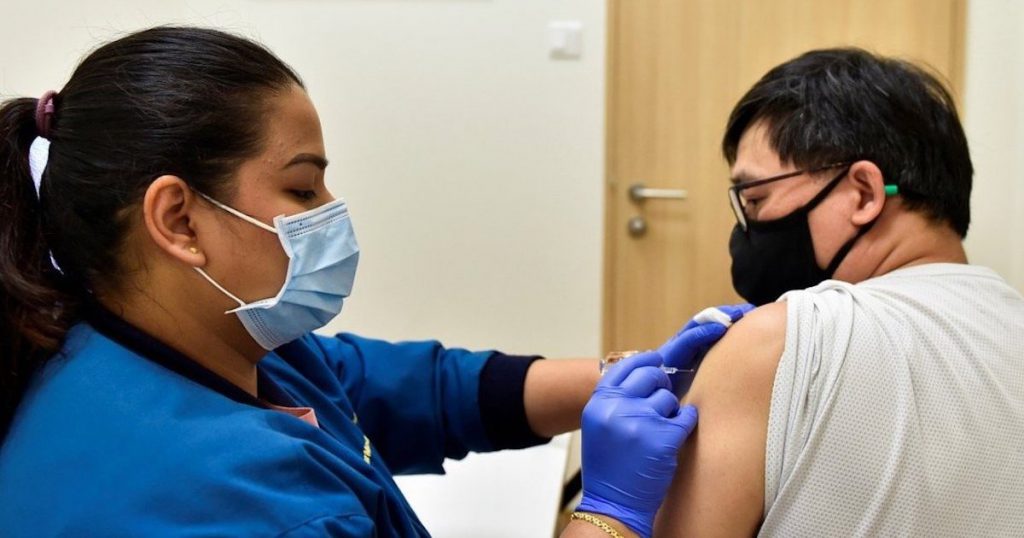
(Disclaimer: All opinions expressed in this article belong solely to the writer)
Throughout the ongoing pandemic Singapore has, in its trademark style, borrowed the best practices from both the West and the far East to tackle the crisis.
Like other successful Asian countries, it has embraced many restrictions and practically shut the borders for a year and a half (and counting), keeping both the domestic spread of the virus and fatalities to the minimum.
Like the best performers in the West, however, it was also the first in line to acquire vaccines — particularly the most effective mRNA jabs from Pfizer and Moderna, which were offered for free to all residents and rolled out in one of the broadest, most successful global vaccination campaigns, which has now gotten over 80 per cent of people in the city inoculated against COVID-19.
It has also quickly begun a rollout of follow-up booster jabs this autumn, seeing that protection wanes about six to eight months after completing the original double-shot regimen.
As a result, it is easily one of the countries best prepared for the new “living with Covid” reality.
That said, for all its accomplishments, there is still a sizeable portion of the society that — for one reason or another — has refused to take the vaccines, despite its free and easy availability in the city-state. This group, while a minority, threatens the pandemic recovery for everyone.
The troublesome six per cent
The current population of Singapore is approximately 5.4 million people. 4.5 million are fully vaccinated and an additional 100,000 have received at least one jab (what suggests they will, shortly, receive another one).
This leaves about 800,000 people, around 500,000 of whom are children under the age of 12, who — at this point — are not yet eligible to receive a vaccine and their inoculation may only start early next year, when proper approvals are granted.
While they still are an epidemiological concern — as they may spread the virus between each other and in their families — they are also the least likely to suffer serious adverse effects from it. As such, as long as everybody else is vaccinated, their impact should be relatively small.
Unfortunately, there are still 300,000 people who are eligible for a free jab, but haven’t gotten one yet — and they represent all age groups quite equally.
/fig2_30aug.png?sfvrsn=d5ef10d_2)
Even at Singapore’s very low fatality rate of 0.1%, their hesitancy may translate into at least 300 deaths and 600 hospitalisations in intensive care units (ICU), given the figures from the recent four weeks. (Please compare that, if you will, to the current total toll of 30 dead and around 40 people requiring ICU care in the past 28 days to see how much worse the situation can get.)
If it was only about the unvaccinated paying the price for their ignorance, I would be quite indifferent about them having to pay it. They knew the risks, so they have to bear the consequences. But the problem is that a society of millions is often only as strong as its weakest links.
Firstly, even fully vaccinated individuals are at risk of contracting the disease and dying from it. It’s much smaller, but it exists.
Given the current figures, continued vaccine hesitancy could add another 100 dead and another 600 people in ICU, bringing it to a grand total of 400 dead and 1200 requiring intensive care. This is still very low by global standards, but unacceptably high domestically.
Secondly, the Singaporean society is generally risk-averse and has gotten used to considering almost any number of local cases as unacceptable, putting pressure on the government to continue with socially and economically crippling restrictions. However, these threaten everything, from employment and education, to timely completion of HDB apartments that thousands are waiting for.
Despite warnings from the multi-ministry task force that daily number of cases can climb to 3,000 in the coming weeks as the country reopens its economy, the authorities faced considerable public pushback which, again, forced them to reapply some pandemic curbs, scale back public gatherings and make work-from-home the default mode for companies able to offer it.
Unfortunately, Singapore is not a country that can remain self-sufficient in unending lockdowns.
The cost of staying isolated
As a small island that thrives on international trade and which imports pretty much all of the goods and food consumed locally, it is always going to face a risk of some seepage of infectious diseases at its ports of entry. Larger countries can feed themselves, but Singapore can’t.
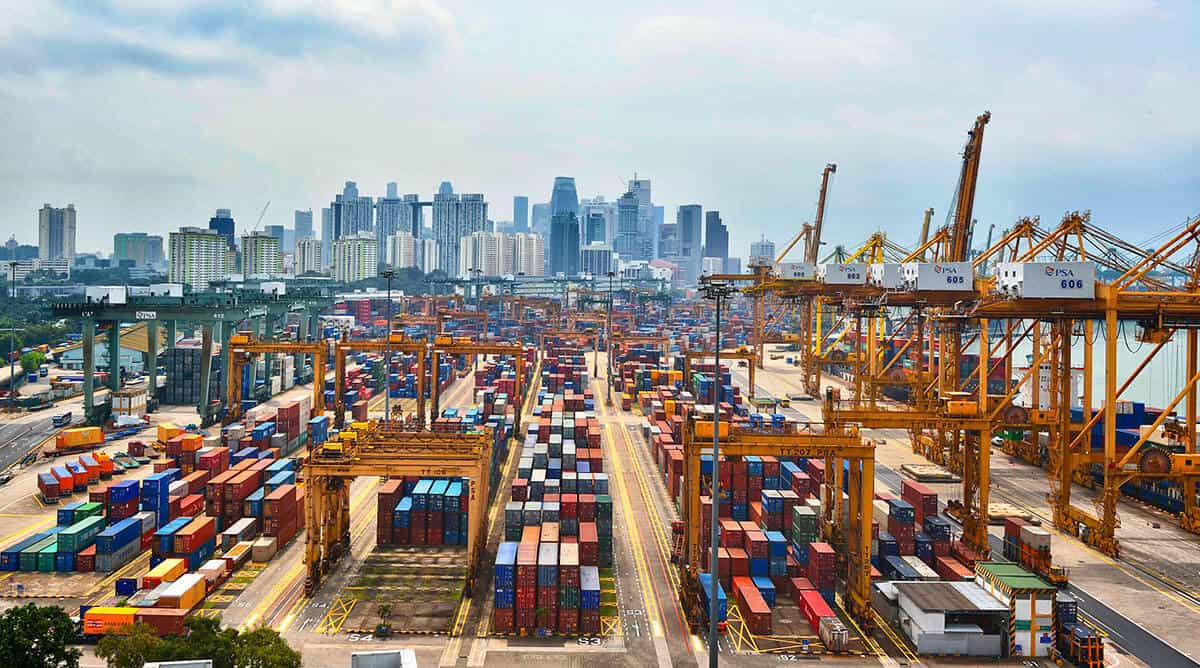
Having to deal with another 300,000 people, who are effectively stabbing the rest of the society in the back simply because of unfounded hysteria and fear, often perpetuated by conspiracy theorists on the Internet, is simply untenable. A small minority cannot hold the entire country hostage.
Moreover, in the past 18 months, as the rest of the world was consumed by the fires of the pandemic, which killed approximately five million people worldwide, Singaporean policies have kept it very safe in comparison, winning it global praise.

But today, as the world is reopening — often deciding to live with the new waves of the virus — keeping Singapore’s borders shut would be downright suicidal.
Thus far, Singapore has been winning foreign business over with its pandemic policies — as I wrote last week — in contrast with say Hong Kong, which may be recording fewer cases but is reeling from significant economic pressures, which have only worsened its already bad situation.
It has to stay this course, or else it is not just going to miss out on the emerging opportunities, but its currently strong position may begin to erode as well.

Let’s take Singapore Airlines as an example. As long as international air travel is in a freeze, the company is in a comparatively good shape versus its competitors. But as they begin flying again and it remains on lockdown, unable to serve its intercontinental routes at full capacity, it is going to be left behind and lose billions of dollars it has raised during the past year.
The extra money has placed it in the pole position to leap ahead once the skies reopen. But if it is forced to operate below its optimal levels, its situation is going to change from one of advantage to one of a potentially lethal burden.
The same is true for other sectors of the Singaporean economy. The very openness and dedication to living with the virus, which is already attracting foreign capital to move to Singapore in the presence of uncertainty elsewhere may quickly end, if the authorities are forced to retain more restrictions than for example, countries in the West.
There’s nothing worse for business than uncertainty. Stability is one of the cornerstones of Singapore’s position in the world and its attractiveness to business. However, the spectre of enduring restrictions may cool positive attitudes and even drive capital away — or, at least, make foreign investors re-examine or postpone their plans in the city-state.
This would cost money, jobs and Singapore’s reputation — all because a handful of people are being baselessly unreasonable, allowing the disease to spread at levels higher than it otherwise would have been able to.
The facts are indisputable — half of ICU cases and three-quarters of recently recorded deaths occurred among the unvaccinated. You may think that the differences are, therefore, not so huge – until you consider that the unvaccinated are only six per cent of the total population eligible for vaccination (with the rest being kids that are the least affected by the disease).
Since these six per cent are responsible for half of all severe cases and about 75 per cent of deaths, it means that refusing to get the jab makes you around 10 to 12 times more likely to suffer and/or die, what is consistent with findings elsewhere in the world (a recent study in the US established the unvaccinated are 11 times more likely to die from COVID; meanwhile data from Israel shows that unvaccinated 60+ year olds are 15 times more likely to leave the hospital in a casket rather than on their two feet).
The virus is here to stay
2021 is much different than 2020 was and, accordingly, we all (globally) need to change our mindsets too. It’s not likely that COVID-19 is going to be wiped out, but thanks to vaccines, we are able to control it and minimise its damage.
While it made sense to obsess about the daily number of infections last year, it is no longer the case today, since (as long as you are inoculated) the risks are considerably smaller.
What we need to focus on is protecting the sick and elderly, track the evolution of the virus, and keep an eye on severe cases and deaths — which are really the only metrics that matter now, as they may overburden the healthcare system.
In a typical year, about 800 people die of the flu in Singapore. This is 10 times the number of deaths that COVID-19 has caused in the past 18 months.

Even at 30 deaths per month, recorded recently (with three-quarter being unvaccinated patients), it would still be just half of the toll of regular influenza. And much like it, it is the most dangerous for the weakened, elderly and sick. We all need a sense of proportion going forward.
Yes, the virus is a threat, it can lead to a severe disease and, occasionally, death. But it’s not the end of the world.
Vaccines have allowed us to gain an upper hand over it, control it, reduce the risks and, with time, may make it a non-issue at all. However, this can’t happen if there’s a sizeable reservoir of people allowing it to keep re-emerging like a mole the rest of us are trying to whack for good.
Featured Image Credit: Reuters
Also Read: Winners and losers of Covid-19 in S’pore’s labour market: Which industries keep hiring?
VC firm creates a one-stop site to find resources on Malaysia’s startup ecosystem easily
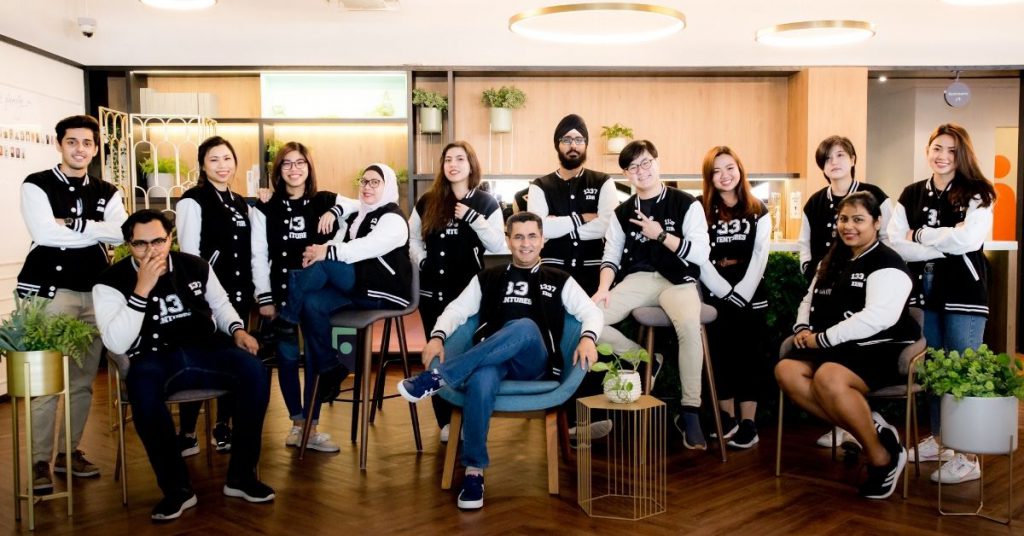
It’s not uncommon to find startups in a red ocean, filling a perceived gap in the local market while unaware of competitors already existing. At Vulcan Post, we sometimes come across pitches claiming a solution is the first of its kind, when we know full well it’s not.
Early-stage venture capital (VC) firm 1337 Ventures has had similar experiences. “When we run our early-stage programme, it’s shocking how many people are solving the same things over and over again without knowing there’s already someone else doing so,” said its CEO and co-founder Bikesh Lakhmichand.
“We wanted a way for local startups to know what else is out there, either for competitor analysis or possible startups to synergise with.”
While working from home during the pandemic, the team brainstormed ideas that could benefit the startup ecosystem. Other than launching an online accelerator programme, they also came up with Muru-ku.
A place to find all things startup
Built in-house, Muru-ku aims to be an independent and collaborative platform providing the latest information in Malaysia’s startup ecosystem.
To do so, the platform compiles and consolidates a list of active Malaysian startups, VCs who can invest in them, along with grants, events, and mentors available.
On top of that, Muru-ku has an analytics section providing data on the different types of verticals startups are in. This is so users can get a rough idea of how saturated some of the areas are, and how funded some local startups are.
“Often we are asked [by corporations] how many fintech startups there are in Malaysia, how many of them focus on something specific such as a SaaS model or within the savings space. It’s interesting how there’s never been a way to consolidate them all under one platform,” Bikesh pondered.
To hopefully spark fresh ideas and startups, Muru-ku also has a section listing problem statements worth solving to inspire entrepreneurs in coming up with a solution around them.
One such example is:
Data collected from various points that are not consolidated may enable fraud in the financial services sector. Find a solution to detect fraud by individual or companies through utilisation of collected data from various data points in a single platform.
For startups, investors, governments, and maybe students
The startup ecosystem is a fragmented one, and though there are online communities to help, it can often be difficult for entrepreneurs to access all the information needed to grow their startup.
Hence, Muru-ku consolidating such resources can work as a stepping stone for new founders to learn about the market.
Likewise, local or foreign investors are able to discover up and coming startups with funding potential through the Malaysian Startups List. VCs or angel investors can filter them through verticals, stages, and find the latest startup events happening in Malaysia.
The event section was added as the 1337 Ventures team were looking for a better way to notify entrepreneurs of available online events without having to flood their subscribers’ inboxes.
“A lot of great events were either missed or had a poor turnout due to lack of marketing or access to an audience,” Bikesh explained. “This way, you could find the next accelerator intake, VC pitching events or a great user group meetup by every ecosystem player under one roof.”

Bikesh also added that government agencies have benefitted from Muru-ku as they’re able to showcase their grants and events targeted at startups while also learning about the startups and VCs in Malaysia.
“We also hope that students will find Muru-ku.com beneficial in their research or hope to embark on the startup journey,” said Bikesh, clarifying that Muru-ku will remain free to access.
Scouting for names
As the site is run by VCs, they actively scout for startups, events, and VCs to be listed on Muru-ku. To streamline the process, the team follows a simple criteria before names are listed.
To be featured on Muru-ku’s Malaysian Startup List, businesses should be registered in Malaysia, but founders don’t necessarily have to be Malaysian. “There are certain conditions to differentiate a small business from a startup. Our analysts will filter them out and do a background check before listing them on Muru-ku,” added Bikesh.
For the Startup Event list, names must be reputable events related to startups, not just any get rich quick scheme. 1337 Ventures will also evaluate the events’ content and determine if they would benefit startups.
VCs are chosen solely based on whether or not they’ve invested in Malaysian startups before. Mentors consist of experienced startup founders, business leaders, or angel investors who are interested in helping build up the Malaysian startup ecosystem.
Speaking of names…
When asked about Muru-ku’s name which seemed to have nothing to do with businesses or startups, the team shared that the “muruku” was originally meant for a project the firm didn’t pursue.
It was inspired by a muruku seller with a small kiosk in KL Sentral. The team offered to help him digitalise his business to scale, but he wasn’t keen on doing so as he merely wanted to be a supplier.
This led to 1337 Ventures contemplating running an e-commerce site as a project for their younger team members. Lockdowns ended up putting the project on hold and the name was eventually used for the aggregate platform.
“We thought it would be funny, and people are always asking us about the meaning of 1337 anyway. Here’s another one they can continue asking,” joked Bikesh.
(For those curious, here’s what 1337 Ventures’ Hiredly page shares: Leet (or “1337”), also known as eleet or leetspeak, is a system of modified spellings used primarily on the Internet. It often uses character replacements in ways that play on the similarity of their glyphs via reflection or other resemblance.)
Trust the VCs to know how to grow a venture
1337 Ventures plans to expand Muru-ku to include startups around SEA within the next 3 years. In doing so, startups planning to expand are able to easily find competitors and connect to investors in that country or region.
For now though, the team will focus on growing Muru-ku solely on the Malaysian ecosystem.
Barely a year old, the site is already equipped with a handful of startups on its list, but it has many more to add with a long list of self-applicants waiting for verification.

The team will also be marketing Muru-ku to more corporations to help build their awareness on the solutions startups can offer that could help them with their own problem statements. In turn, it can help more startups secure paid proof of concepts (PoC), contracts, or partnerships with these corporations.
The final component for Malaysia before we look into the region is to establish a better angel network. We think this is key towards growing the startup scene and funding more early-stage ideas. Definitely, something we think would be beneficial for the ECF industry at large too hence we’re looking at having a more structured approach to educating angels and exposing them to quality deals at scale.
Bikesh Lakhmichand, CEO and co-founder of 1337 Ventures
While the aggregate site put out by 1337 Ventures is a respectable and resourceful project, it does pose the challenge of maintaining the site and its listings.
Startups can pivot and expand quickly, and may offer a totally different solution from what they started out doing.
To ensure that the information on Muru-ku remains accurate, the VC firm would require a dedicated team to constantly check and update the descriptions of each startup, VC, and events on an annual or even quarterly basis.
- You can learn more about Muru-ku here and 1337 Ventures here.
- You can read about other Malaysian startups here.
Also Read: 9 facts about personal loans in M’sia you should know to borrow responsibly in a pandemic
Featured Image Credit: 1337 Ventures / Muru-ku
S’pore firm Ninja Van raises US$578M in Series E round – investors include Alibaba Group
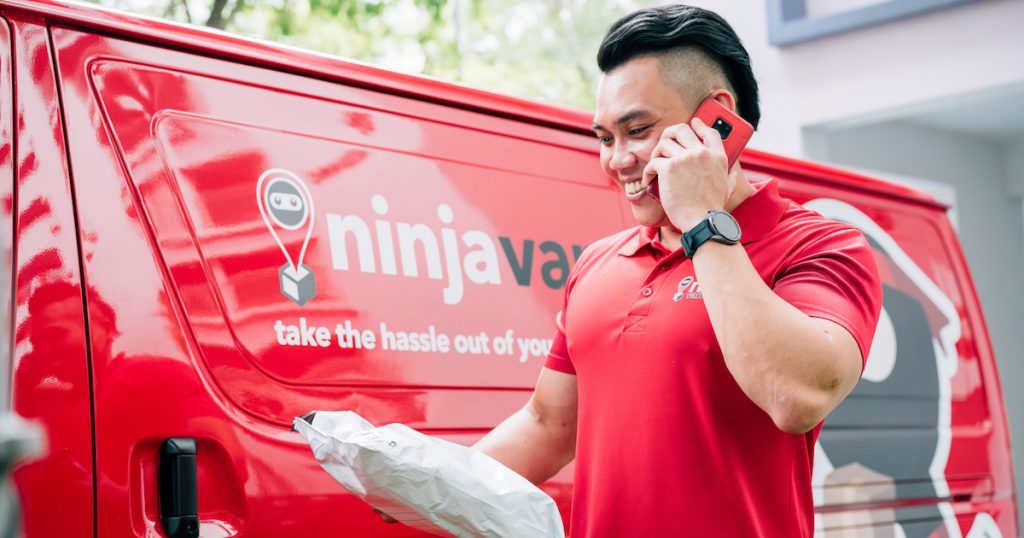
Homegrown logistics tech company Ninja Van announced yesterday (September 26) that it has successfully raised US$578 million (S$781.5 million) funding in a Series E round.
Existing investors in this round include Alibaba Group, GeoPost/DPDgroup, Facebook co-founder Eduardo Saverin’s B Capital Group, Monk’s Hill Ventures, and Zamrud, an entity linked to a Southeast Asian sovereign wealth fund.
According to the company, the funds raised will be allocated towards infrastructure and technology systems that will support a sustainable long-term cost infrastructure, as well as the quality and consistency of Ninja Van’s operations.
Funds will also be invested in Ninja Van’s suite of micro-supply chain solutions to help Southeast Asian businesses optimise e-commerce opportunities.
“The quality of investors joining us in this round of investment is a clear signal that the market recognises the emerging opportunities for e-commerce logistics in Southeast Asia and how as an entrenched player in the region, Ninja Van is positioned to take a central role in meeting the shifting demands of both businesses and consumers,” said Lai Chang Wen, co-founder and CEO of Ninja Van Group.
“We remain committed to the success of all our business partners as we move towards the next stages of sustainable growth and continued innovation. The support from our investors will enable us to continue to build upon the business momentum we have achieved.”
To complement its e-commerce logistics ecosystem, he added that they want to elevate their delivery experience by prioritising shipper and recipient satisfaction, and implementing enhanced and effortless issue resolution processes to provide a seamless experience for all Ninja Van users.
Witnessing strong growth despite Covid-19
Since its inception in 2014, Ninja Van has become a leading regional logistics player in Southeast Asia.
The company’s end-to-end logistics network spans Singapore, Malaysia, Indonesia, Thailand, Vietnam, and the Philippines, connecting over 1.5 million active shippers with close to 100 million recipients.

The company currently employs more than 61,000 staff and delivery personnel that support the delivery of around two million parcels a day throughout the region.
This is twice the number of parcels recorded in May 2020, with one million daily shipment.
Most recently, Ninja Van has also been featured in LinkedIn’s 2021 list of top Singapore companies that are on the rise for showing strong growth this year.
Earlier in July, Chang Wen also shared Ninja Van might be exploring an initial public offering in the United States next year.
Sources close to the company claimed that Ninja Van had passed a US$1 billion (S$1.36 billion) valuation following its US$279 million funding round last year.
Ninja Van’s growth in revenue and orders has surged thanks to an e-commerce boom fuelled by the Covid-19 pandemic.
The seven-year-old startup is at an almost break-even rate and is targeting profitability in 2022. According to VentureCap data, it posted a US$84.1 million loss in 2019, on the back of US$149.3 million in revenue.
Featured Image Credit: Ninja Van
VP Label puts together all the best local products for you to discover in one place. Join us in supporting homegrown Singaporean brands:
[iframe_vp_product src="https://vulcanpost.com/label/embed-all/" id="iframe1"]
Also Read: Ninja Van CEO “Worked Like A Dog” To Overcome His Lack Of Experience – Now Dominates SEA








